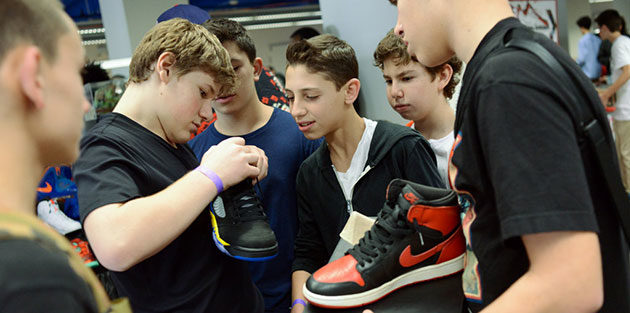Sneakerheads: Some teens are trading shoes and learning something in the process by Jason Kelly
When you think about the ways most teenagers spend their free time, you probably think playing video games, going to the mall, and using Facebook. But if you look more closely, you will discover a lot of kids defying those stereotypes.
These kids are innovators. They take risks. And they aren’t just learning economics from a textbook.
The most recent manifestation of this comes from “sneakerheads”: Teenagers who trade basketball shoes. A recent New York Times article profiles the exploits of these hucksters who buy, sell, and trade limited, collectible sneakers at weekend conventions and over social media:
The teenage traders attending these conventions know the market, reciting resale values, the buzz of a hot trade and the debut dates for new pairs as easily as others can spit out baseball stats.
Some commentators disparage these kids’ activity as crass materialism and faddish speculation. And they’re not alone; their criticisms are not even new. Basketball sneakers have even been blamed for crime waves. But all of this critique misses the point of what sneakerheads are up to. Instead of depreciating the value of the shoes they receive by wearing them around or tucking them away in their closet, they’ve discovered an arbitrage opportunity that allows them to turn a profit. While the less observant scoff, these teenagers pick up market signals and act rationally to their own benefit. Smells like entrepreneurial spirit.
Indeed, they’ve created a marketplace independent from meddling adults and bureaucrats. In their own world, they experiment with different forms of trade and learn valuable lessons throughout the process. They hone their negotiating skills and practice bargaining techniques—because if they don’t, they lose profits.
They’re also learning the mutual benefits of trade. For example, if my favorite player is Lebron, but I received a pair of Michael Jordan shoes for Christmas, I’ll trade my pair to someone who prefers Michael Jordan. Because value is subjective, we’re both better off and, therefore, we are wealthier.
Even more fascinating is that in this world, money is not everything. When offered a staggering $98,000 for his autographed Kanye West sneakers, 18-year-old Jonathan Rodriguez turned it down, saying, “I know I could buy a house with this kind of money. But I’m a huge Kanye West fan. I can just work to get the money.”
Foolish? Maybe. But who are we to say? If Rodriguez values his one-of-a-kind sneaker more than the purchasing power of $98,000, more power to him. The choice is his alone. And who knows if that $98,000 represents the top of the market?
With each transaction, these teens are demonstrating that it doesn’t take a Harvard MBA or an insane programming ability to be entrepreneurial. They’re showing us that economics isn’t limited to the classroom or the boardroom. They’re showing us that looking out the window, as Peter Boettke reminds us, and viewing the world in motion are how we really start to understand the economic way of thinking.
ABOUT JASON KELLY
Jason Kelly is a graduate of Hillsdale College and the Web and Social Media Associate at FEE.


